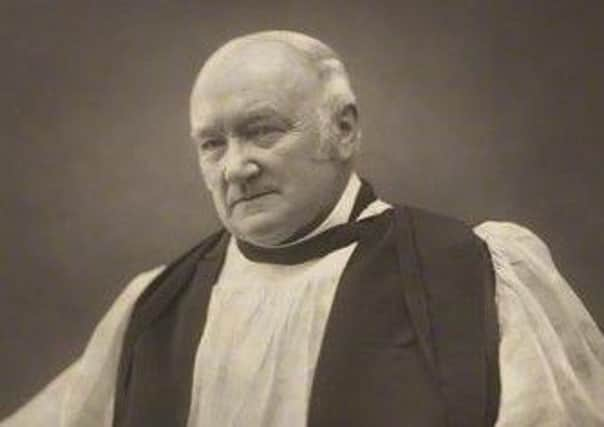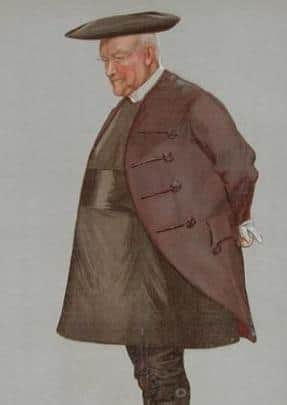Church of Ireland primate who, perhaps unfairly, lived in shadow of his hymn-writing wife


Anthony Trollope’s feeble Bishop of Barchester was mere putty in hands of that termagant, Mrs Proudie. As Bishop of Derry, William Alexander may not have been dominated by his famous wife, hymn writer (’All Things Bright and Beautiful’, ‘There Is A Green Hill Far Away’, ‘Once In Royal David’s City’ and more) and poet Cecil Frances Alexander, but in terms of historical profile he certainly has been comprehensively overshadowed by her.
William Alexander was the eldest son of Robert Alexander, the Rector of Termoneeny in the diocese of Derry, and was born in Londonderry on April 13 1824.
Advertisement
Hide AdAdvertisement
Hide AdHe was educated at Tonbridge School in Kent, and won an exhibition to Oxford in 1841. Despite his genuine scholarly inclinations, he failed to fulfil his academic promise, leaving Oxford with large debts and a fourth-class degree.


At Oxford he was profoundly influenced by the ‘Oxford Movement’ (which sought the return of the Church of England to pre-Reformation beliefs and liturgical practice) and the sermons of John Henry Newman.
When in 1845 Newman left the Church of England and his teaching post at Oxford University and was received into the Roman Catholic Church, Alexander seriously considered following him to the extent that he took his name off the college books and wrote to his mother stating his intention of converting and then left Oxford.
Doubts began to surface on his journey home. He encountered a Quakeress who managed to calm him. This combined with a torturous night of soul searching in a cheap hotel in Birmingham, resolved his doubts.
Advertisement
Hide AdAdvertisement
Hide AdAlexander was ordained in September 1847. He was appointed curate of Templemore and then successively rector of Termonamongan, Fahan, and Camus-juxta-Mourne (the ecclesiastical name for Strabane), all in the diocese of Derry. Eleanor Jane Alexander’s memoir refers to the affection in which her father held his parishioners. He was evidently a conscientious parish priest, he and his wife taking great pains visiting the sick and all in the parish who claimed any connection with the Church of Ireland. They were ecumenical too in calling with those Presbyterians and Roman Catholics who they thought would appreciate a visit.
In October 1850 he had married Cecil Frances, the daughter of Major John Humphreys, land-agent to the fourth Earl of Wicklow up to 1833 and then to the second Marquess of Abercorn.
Her religious outlook and writing had been strongly influenced by her contacts with the ‘Oxford Movement’ and in particular with John Keble, Professor of Poetry at Oxford from 1831 to 1841, and another leading light of the movement.
The Alexander family was greatly perturbed that William’s bride was six years older than he was. This is why Mrs Alexander’s date of birth has appeared in some works of reference as 1823.
Advertisement
Hide AdAdvertisement
Hide AdFanny Alexander was attracted to clever men. A previous romantic interest was William Archer Butler (who incidentally preached the sermon at Alexander’s ordination). Reputed to be ‘the cleverest man in Ireland’, Archer Butler became Professor of Moral Philosophy at Trinity College, Dublin, when he graduated (his intellectual prowess was such that the chair was created specifically for him) and Rector of Raymochy near Dunfanaghy. While engaged in famine relief, he caught ‘famine fever’ and died very suddenly in July 1848. Fanny, many years later, told her two daughters that she had been in love with Archer Butler and that it was his death which had prevented the match.
Despite the fourth-class degree, Alexander was a highly intelligent and scholarly man with a transatlantic reputation. He was a gifted poet (like his wife) and an eloquent preacher, his sermons being greatly admired for their simplicity and warmth. Retaining links with Oxford, in 1850 he won the Denyer theological prize for an essay on the ‘Divinity of Christ’. In 1853 he recited in the Sheldonian theatre a congratulatory ode to Lord Derby, on his assumption of the chancellorship of the university. In 1860 he obtained the university prize for his sacred poem ‘The Waters of Babylon’. In 1867 he very narrowly lost out in the election for the professorship of poetry at Oxford.
On October 6 1867 he was consecrated bishop of Derry and Raphoe.
The early years of his episcopacy coincided with the disestablishment of the Church of Ireland. He opposed disestablishment and spoke forcefully against it in the House of Lords. While Mrs Alexander was never reconciled to disestablishment, Bishop Alexander led his diocese with good grace in coming to terms with the challenges of the new dispensation and diligently attended to his pastoral duties, confirmations, ordinations and visitations.
Advertisement
Hide AdAdvertisement
Hide AdAs early as September 1869 William Connor Magee, the Bishop of Peterborough and future Archbishop of York, identified three of those challenges: liturgical revision, lay tyranny and schism between north and south. (Bishop Alexander preached the sermon at Magee’s enthronement as Archbishop of York on March 17 1891.)
Mrs Alexander died at the Bishop’s Palace in Londonderry on October 12 1895 and is buried in the City Cemetery.
On February 25 1896 Bishop Alexander was elected Archbishop of Armagh and Primate of All Ireland. Although by conviction a high churchman, he enjoyed the support of all parties within the church.
Arguably his leadership might be regarded as unspectacular and uneventful but that may have been exactly what the church required in those years. Armagh was less taxing in one respect than his former diocese because it was served by an excellent rail network which made travel a great deal less onerous.
Advertisement
Hide AdAdvertisement
Hide AdHe resigned the archbishopric on January 30 1911, and died in retirement at Torquay on September 12 later that year. He was buried in Derry Cemetery beside his wife.
In St Columb’s Cathedral in 2018 at the launch of an exhibition and publication commemorating the life and work of Mrs Alexander on the bicentenary of her birth the historian Richard Doherty, the author of the publication, observed that Mrs Alexander had managed to do what very few Victorian women had done: she put a man completely in the shade. ‘That man,’ Mr Doherty said, ‘was her husband who, with any other wife, would have been much, much better known because of his own gifts.’